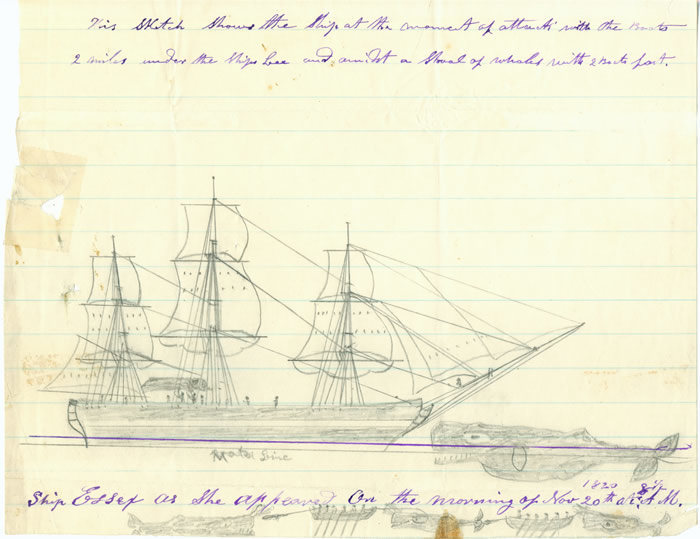A whale of a tale
 It’s about this whale. Specifically the apparently obscure fact, even by the standards of this series, that on November 20, 1820, an 80-ton sperm whale attacked and sank the Massachusetts whaling ship Essex off the western coast of South America. You go whale, you may be thinking. Instead it was you go Herman Melville, which isn’t as good.
It’s about this whale. Specifically the apparently obscure fact, even by the standards of this series, that on November 20, 1820, an 80-ton sperm whale attacked and sank the Massachusetts whaling ship Essex off the western coast of South America. You go whale, you may be thinking. Instead it was you go Herman Melville, which isn’t as good.
It was also you go cannibalism, because the Essex sank 2,000 miles off the coast. And during 95 harrowing days at sea the originally 20 survivors ate five of their fellows who died and then, yes, began drawing lots to see who else they would eat and got through seven others before the last eight were rescued.
Two of that eight later wrote accounts of their suffering that, according to Wikipedia, “inspired Herman Melville to write his famous 1851 novel Moby-Dick.” Which is a bit odd because unless I missed something, nobody eats anybody in Moby Dick.
You have read it, of course. I mean, it’s the Great American Novel or at least one of them, along with The Great Gatsby, The Grapes of Wrath and some dreck by Hemingway all of which make you wonder what’s so great about great American novels. I personally found Moby Dick ponderous, and the endless intercalary chapters about whale skin were a total waste of paper and I would say my powers of concentration had I in fact bothered to concentrate on them sufficiently to be entirely sure they were intercalary chapters and not just long boring asides.
Which I think I just engaged in one of here. My point is, you have very probably been forced to read Moby Dick at some point, in which case you may very well share my view that the best description of it ever is in the musical Wonderful Town where a woman is trying somehow to jump-start the conversation at a failing cocktail party and comes up with “I was re-reading Moby Dick the other day... I haven’t read that since… well... I'm sure none of us has. It's worth picking up again...:” and then into the ensuing deadly silence petering out with “it's about this... whale.”
Apparently it’s not. It has a whale in it, a big one, white, bites off legs and stuff, modeled on a real, elusive albino whale called Mocha Dick. But apparently it’s really about all those great things like God, social divisions, good and evil and how to render blubber. Not that anyone noticed in 1851 when it was published; it was a commercial failure that sold barely 3,000 copies during Melville’s lifetime and was out of print when he died in 1891. But then people like Faulkner and D.H. Lawrence decided it was strange and wonderful. And to be sure the opening line “Call me Ishmael” is so famous even I have parodied it.
To be fair, there is one thing in the book I do remember approvingly: Melville’s description of the incredible perils of manning a small whaling-boat trying to harpoon a whale, with the threat of death ever-present from the whale’s tail, a rope snaring your arm or leg as it hisses out affixed to a harpoon that has struck its target and so on. And then his point that we do not feel any such danger on an apparently safe city street yet death may await as at any turn from a runaway horse (it was 1851), a falling brick or some such accident. Oh, and the incredibly gross bit where someone harpoons an elderly whale in a giant blood blister. That has stayed with me.
For the rest, it’s one of those classics that makes we wonder about the canon. Though perhaps I should reread it. I haven’t since… well, I’m sure none of us have. But it’s about this whale and, given what humans have done to whales in recent centuries, I do like the bit where he sinks the ship.
P.S. It also set up the gag in the dud sequel Son of the Pink Panther where it turns out Clouseau and Marie Gambrelli had a son who is now a policeman and doesn’t know who his father was because, she explains “Imagine you've always wanted to be a great fisherman... and suddenly you discover that your father was Captain Ahab.”